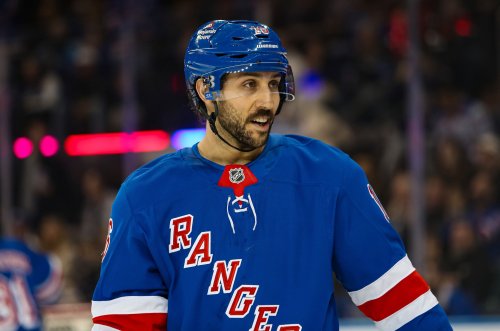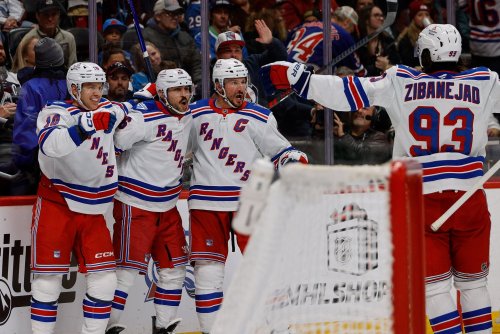
Expectations are everything.
Let’s say you claim a veteran forward off the scrap heap, and you plug them into a bottom-six role. They do all right, chipping in, say, 23 points while providing a little extra value on the penalty kill.
That’s a solid pick-up, right? You get a mediocre return, but the cost was so low that it doesn’t matter. That was what Daniel Winnik provided for the Minnesota Wild this season, and that’s why most people would probably be OK with him returning next year.
What Marcus Foligno gave the team wasn’t much different from what Winnik provided. In his first season with the Wild, Foligno gave the team 23 points. He held his own in terms of possession statistics, and provided a little extra value with his physicality.
And if you followed Foligno’s career in Buffalo, or did basically any research on him, that’s what you should have expected from him. In each of the last three seasons, Foligno has scored 23 points, and hasn’t exceeded that mark in his career.
There wasn’t really much upside to Foligno, either. Foligno scored 13 points in a 14-game cup of coffee back in 2011-12, but hasn’t come close to replicating that since. The reasons for that are pretty obvious. He was never a possession driver the way Nino Niederreiter is. He doesn’t generate shots like Jason Zucker does. He doesn’t have Mikael Granlund’s skill.
Those three players were late bloomers, not really moving the needle until their age-25 seasons. But when you look at Foligno’s career, you could see that he didn’t do any one thing well enough to suggest a breakout in his age-26 season.
That wouldn’t have been a problem had former general manager Chuck Fletcher picked him off the waiver wire. Or signed him as a low-risk free agent. Or acquired him for a third-round pick via trade. If Fletcher wanted to make his bottom-six more physical, Foligno honestly wasn’t a bad player to target.
But the price paid to get and keep Foligno threw those expectations out of whack. Fletcher acquired Foligno (along with Tyler Ennis) in a trade for Marco Scandella and Jason Pominville. The trade was pitched as a salary dump for a Wild team in salary cap hell, but it wound up saving the Wild very little money, for the price of two depth contributors.
The gamble was that Foligno and Ennis could provide comparable value. And Fletcher announced his belief that Foligno would be a contributor to the Wild when he signed Foligno to a four-year, $11.5 million deal.
That’s not a deal you should make to a grinder who doesn’t provide much on the scoresheet. And if you look at Foligno through that lens, there’s nothing he can realistically do to live up to your expectations.
But if you put aside the cost to get him and his contract, he was fine. Out of the Wild veterans who saw fourth-line time (Foligno, Ennis, Winnik, Matt Cullen, and Chris Stewart), he was probably the best. He worked hard, hit players, and got to the net, even if he only got rewarded for it 8 times.
Foligno was also part of a line down the stretch along with Winnik and Joel Eriksson Ek that clicked. They didn’t score a whole lot, but Boudreau was able to put them on the ice with confidence, and they were able to get plenty of good shifts in and keep opposing offenses out of their zone. If you’re getting that from a fourth-line, you’re doing OK.
In fact, that line was probably the best the (admittedly, battered, bruised, and injured) Wild had in the playoffs. They were able to play through Winnipeg’s physicality, and seemed like the only line the Jets couldn’t constantly pin in the Wild’s zone.
Foligno was even rewarded with a goal in Game 3. In it, you can see a bit of what Fletcher had hoped for. A player who could get to the net, tip shots, and knock in rebounds.
Unfortunately, Foligno just couldn’t do that enough to make an impact, and thus justify the price Fletcher paid for him. Fletcher’s miscalculation on that trade and contract likely contributed to his removal from the front office.
But none of that’s on Foligno. Any clear-eyed prediction of what Foligno could bring to the table would have predicted he was likely to do exactly what he did this season.
For hitting his typical performance without making a true impact on the team’s fortunes, I give Foligno a C. If he can figure out how to turn that net presence into more tipped shots and goals, he can get a higher grade next year. But in all likelihood, he is what he is.
Think you could write a story like this? Hockey Wilderness wants you to develop your voice, find an audience, and we'll pay you to do it. Just fill out this form.








Recommended Comments
There are no comments to display.
Join the conversation
You can post now and register later. If you have an account, sign in now to post with your account.
Note: Your post will require moderator approval before it will be visible.